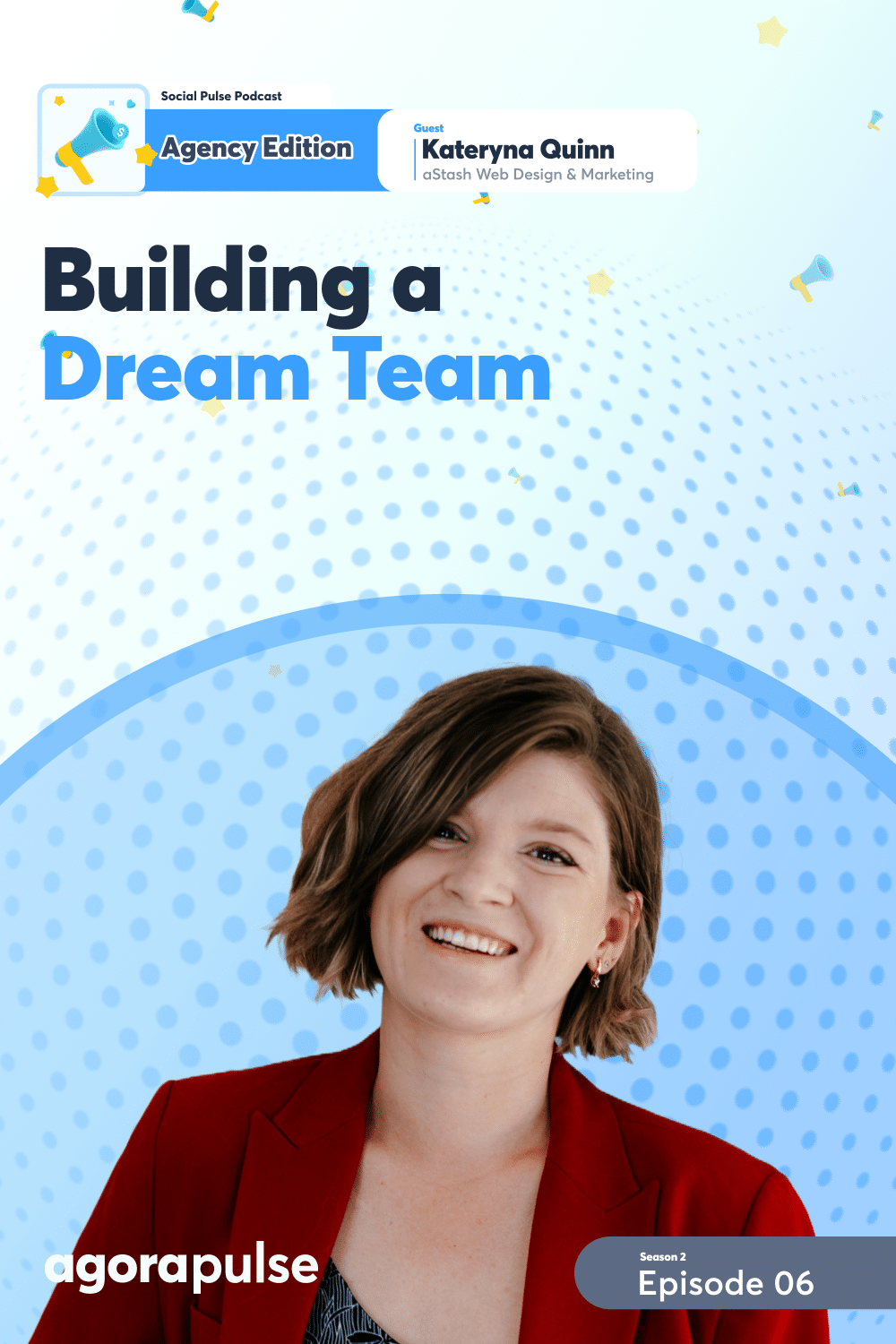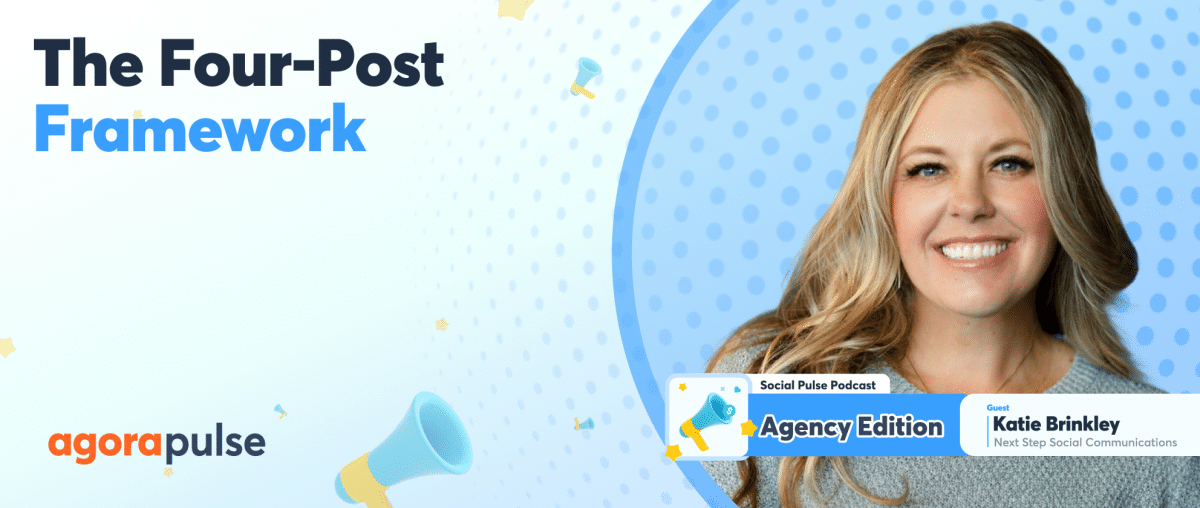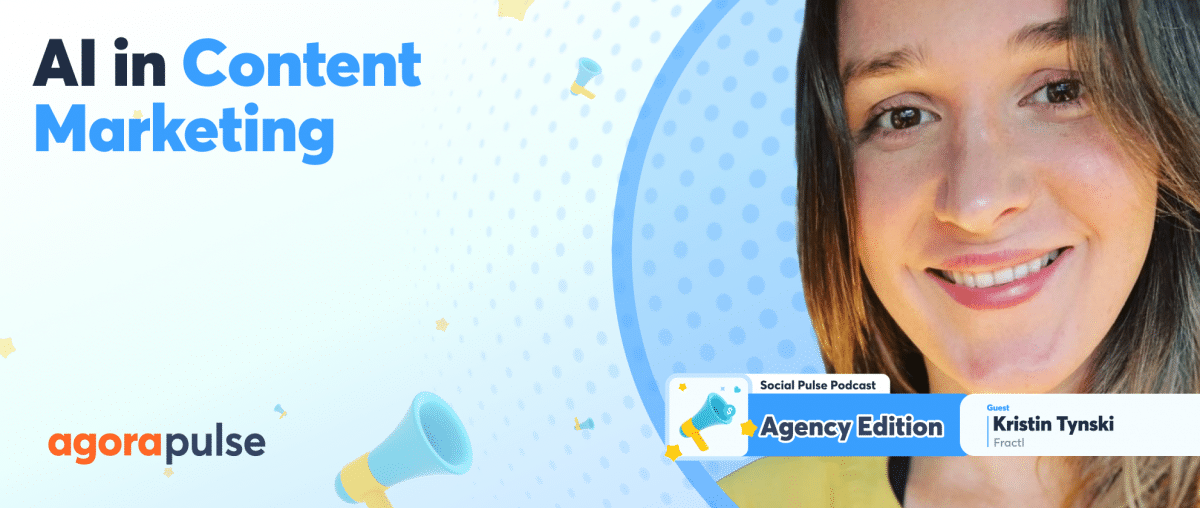Are you stuck in the never-ending cycle of trying to do everything yourself in your agency? It’s a common trap for many entrepreneurs, especially when scaling up. But how do you move from being a one-person show to building a dream team that can take your agency to new heights?
We’re thrilled to have Kateryna Quinn, a Forbes-featured entrepreneur and the founder of AStash Web Design and Marketing, answer those questions in this recap of Social Pulse Podcast: Agency, hosted by Agorapulse’s chief storyteller, Mike Allton.
Listen to the full podcast below or read on for the transcript.
Kateryna has faced and conquered the challenges of expanding her team, developing robust business processes, and shifting from managing all tasks herself to delegating effectively. If increasing your team’s efficiency and mastering the art of delegation is your goal, Kateryna’s journey will provide you with the practical insights you need.
Shifting from DIY to Teamwork
Mike Allton: To start, could you share what prompted you to shift from doing everything yourself to actually building a team?
Kateryna Quinn: Yeah, so it’s actually my daughter. I had a daughter in 2023, and that’s been the biggest life change for me, as well as a key decision-maker. I started this business in 2018, and for a few years, I was growing it slowly with a small team. 2021 was our best year, but after that, I hit my breaking point. I couldn’t scale the business, and I was working around 9,000 hours a week. It was absolutely exhausting, and I couldn’t see a way to move away from all that work while still growing.
Then I got pregnant—whether it was luck or fate, I’m not sure—but I wanted a child. I had my daughter in 2023 and took a few years to maintain the business, not trying to scale it, and focused on figuring out my personal life. When I returned to work when she was about 10 months old, fully ready to get back to the agency and scale it, I realized I couldn’t work the way I did before. It just wasn’t going to work for me anymore. I needed to make a change, to figure out how to run the business without being so hands-on, so I could spend time with my daughter. That became my main reason for making a real change.
Mike Allton: That makes a lot of sense. So many of the folks who come on the show are talking about the need to find a balance—and balance is really almost a bad word or an inappropriate word because it’s never a true balance—you’re never working or not working at exactly the same rate.
But it’s about this idea of making sure that we’re allotting enough time in our lives to do the things that we need and want to do—whether that’s raising a family or spending time abroad. There are a lot of different themes that people have come up with, but it’s all around that central idea of not spending 80-90 hours a week doing nothing but work and just working to live instead of living to work. But now that you’ve made that decision …
What were the initial challenges in trying to delegate some tasks that you’ve been doing?
Kateryna Quinn: The first challenge I faced was as basic as creating job descriptions. I realized I needed to thoroughly understand the tasks I was handling.
So, for about three months, I documented everything I did daily to figure out what tasks could be handed off to others. This process involved writing down all the tasks for each position based on what I was currently doing and then determining the budget for those roles.
Budgeting was a big deal, especially when you don’t have many clients and aren’t yet able to grow and scale to generate more revenue. I had to figure out which positions were most important to hire for first and which would be the most cost-effective. It was crucial to prioritize tasks, identifying which ones were low-value that I could delegate, and keeping the high-value tasks for myself until I could afford to delegate them as well.
This approach was key to gradually growing the business.
Since we’re a full-service marketing agency, it made things more complicated. We have a lot of different jobs happening, and I was handling many of them myself, like designing, front-end development, and even some SEO tasks. It was crazy.
When you hire, it’s challenging to find someone who can do everything, so I had to figure out which job positions were most important to fill and focus on hiring for those roles.
Our focus is on web design and SEO, so my priority was to ensure we had web design and development fully covered. My first hires were a front-end developer, a full-stack developer, and an assistant or project manager. The assistant would initially handle lower-value tasks and could eventually grow into more important roles.
With three key people—a project manager to handle overall management and client content, a designer to create the website, and a developer to build it—we could fully cover a web design project. This made it easier to delegate that entire service.
However, since we offer many different services, it was difficult to hire all of them at once. So, I focused on fully delegating one service at a time, starting with web design, and ensuring we could deliver that service completely before expanding to others. This way, I could confidently advertise web design services, knowing I had a team that could handle it without needing my constant involvement.
Mike Allton: You said it so well from the very beginning that the first big challenge is documenting what it is that we do. And if you’re lucky, you already have a step-by-step process that you follow. And so you just need to film yourself doing that process. And now you’ve got an SOP that you can hand out to somebody else.
Most of us aren’t that lucky in the things that we’re doing every single day. We don’t necessarily have a documented or thought-through process or a framework that we’re following. We might approach every project and every client a little bit differently. So we have to stop and think through, “How can I standardize how I’m doing this thing, whatever that thing is, and do it in a way that I can predict excellence every single time and then document it?” So that’s an absolutely huge challenge. And I know that you talked about the different kinds of people that you’re going to bring in, identifying where you need to, and filling in the holes to make sure you’ve got that complete stack of processes filled.
How do you identify the right people for your team?
Kateryna Quinn: Yeah, first of all, it’s a lot of trial and error.
- Over the last six years, I’ve hired around a hundred people, including many for contract jobs or small tasks. Most of them didn’t work out. When I started this business, I had no experience in an agency setting—just marketing for a furniture interior design store—so I was figuring it all out as I went.
- I tried various hiring methods, including test tasks and contract positions, but they didn’t work out.
- Now, I hire contractors for a three-month trial period. They work full-time during this trial, but they’re not officially employed yet. This allows me to evaluate their performance, skills, and how well they fit with the team and workflow.
- What I’ve found most successful is focusing on personality and work ethic. Skills are important, but they’re secondary to whether someone is willing to work hard, is professional, and takes the job seriously. I’ve had many people who were sloppy and didn’t pay attention to details, which is a deal-breaker for me because I’m quite a perfectionist.
- Now, I conduct two interviews for each position: first with my project manager, and then I personally interview the candidate. I pay close attention to how they present themselves, whether they’re on time, and if they seem genuinely interested in the role.
- It’s crucial for me that the people I hire care deeply about their work and align with our core values.
Delegation/Accountability Strategies
Mike Allton: We’ve had a lot of folks on this show and agency owners that I’ve talked to outside of the show that could definitely relate to everything you’re talking about. They jump into the business because they’re excellent at marketing, and they’ve got to figure out as they go how to build the team and how to grow and scale the agency. That’s a big part of why we had the show in the first place.
But I’m wondering: Once you start to bring people on, what were some of the strategies that you brought on to help keep them accountable, right? You talked about how important it was that they care, that they have this attention to detail.
How are you being effective in your delegation and ensuring accountability within that team?
Kateryna Quinn: Communication is crucial for us, especially since many of our team members work remotely. We have a small team in Fort Collins, but the rest are scattered across various locations.
Effective communication is key to success in a remote team; without it, you risk failure.
To ensure smooth operations, we hold regular team meetings and personal check-ins with each staff member weekly. These meetings can range from a quick 15-minute call to a more in-depth two-hour discussion. It’s essential to understand how each team member is feeling and how their work is progressing and address any questions or issues they may have.
We also use project management software, which is indispensable for managing a team of 11 people. The software helps us build roadmaps, assign tasks, track workloads, and monitor deadlines. Time estimates for each task are crucial for planning projects and providing accurate proposals to clients. We typically work on a flat-rate basis rather than time-based billing, so knowing how long tasks take and the rates we pay is vital for accurate pricing. The software also facilitates collaboration on documents and other shared resources.
While we allow flexible schedules and account for different time zones, team members must work a few hours each day to address urgent tasks promptly. This ensures we can handle client requests and emergencies efficiently, regardless of time zone differences.
Mike Allton: Are you using a high level, or what tool are you using?
Kateryna Quinn: We are using Clickup. We used to use Asana but faced some challenges, but we switched to ClickUp, and it’s been pretty great for us. There are still a few features we need that aren’t quite there yet, and we’re not exactly where we want to be at this point.
However, it’s a significant improvement, and we’re optimistic about reaching our goals in the coming year. We’ve just started the process of really growing and scaling, so many of our processes are still new and need some fine-tuning. Despite that, ClickUp has been quite effective for us. It helps keep everyone on top of things and aware of ongoing projects, which has been great overall.
Documenting Agency Workflows
Mike Allton: Now earlier we talked about just briefly documenting processes. I wonder if you could elaborate a little bit more about that and talk about your process for documenting workflows and how that’s implemented and impacted your agency’s operations.
Kateryna Quinn: I’m an old soul. I start by writing everything down in my notebook. It’s actually how I think best: to write things down with a pen and paper. I write all the tasks I’m doing and what the timelines for those are, usually how many hours each takes. For example, our SEO contracts usually last eight months.
I want to start by writing down the goals, right? The tasks and the goals. I also want to have clear goals for the project, including the key performance indicators, deliverables for the client, and their expectations. I start with, for example, an eight-month timeline detailing what we need to accomplish and what the expected results should be. “Here’s what needs to be done.”
Then we break it down into half-term goals, so like four months.
We outline what we need to achieve in those four months, including our milestones and goals.
After that, we further break it down month by month, specifying the goals for each month. What are the tasks? Each task can be detailed over 10 to 15 pages. I want to break down every single task, even the smallest ones, like following up with a client via email or calling the client. It’s crucial to document everything because otherwise, it won’t work. For each month, like September, October, and November, we list all the tasks with their timelines. This is the first step.
After we agree on everything and get approval from the team and the client, we move it to the roadmap in ClickUp. There we create the roadmap, assign each task to the person responsible, and set time estimates and deadlines.
I think keeping tutorials and documentation for each task is very important. We are far from having this fully done; we’re slowly working on it. I honestly believe it might take another three to six months to complete all of our processes.
So right now, for the main processes and whatever processes we have already completed, we create Loom videos and shared documents for each specific task. We document what we do, and how we do it, and then record a video of the process, keeping everything in a shared folder where everyone can access it. This is a must.
You can’t have so many people working without knowing what they’re doing; it’s not going to work well. It’s crucial to have a clear process and everything documented so that everyone can see and access it at any time.
Mike Allton: That is amazing. You weren’t kidding when you said you have an attention to detail … I definitely recommend [Loom]. They’ve got built-in features now that will help you build the SOP from the video itself—so as long as you have a standard process that you can follow in the video, and you’re not wasting too much time trying to figure out what it is that you should be doing while you’re on video at the center process first. Video yourself doing it. It’ll create a lot of that documentation for you.
Motivation and Achieving Goals
Mike Allton: Kateryna, as you’ve been growing your team, you’re documenting all their processes, how are you keeping them motivated and aligned with your overarching goals for your agency?
Kateryna Quinn: To keep everybody motivated, we have a bonus structure to ensure the team knows the goals and what they are working towards. We implement a bonus system where people are rewarded for their successes. For example, TSS (team sales staff) receive bonuses if they achieve our goal of 15 new clients per month. These bonuses are in addition to their commission and salary.
If it’s a project manager, for every successful project that is completed and where the client is happy, we offer bonuses to the team who worked on that project. We’re trying to keep everyone motivated financially where possible.
However, when I interview people, I always make an effort to understand their professional career goals and aspirations.
Some people are not primarily motivated by money. While financial incentives are helpful, others may seek growth opportunities within the company, such as becoming a team lead, managing people, or taking on new and challenging projects. We always strive to provide these opportunities and see what they can accomplish. If they need assistance, we’re here to help them understand what they did right or wrong and guide their growth.
We focus on keeping everyone aligned with our core values, which are crucial to our work culture. During interviews, we discuss these values to ensure candidates understand and align with them. Our core values are passion, quality, and care. Passion is essential for us. I want to see a genuine love for their work in their eyes. When people truly love what they do, it transcends the job and becomes a passion project, which energizes the workplace. Quality is another key value, and attention to detail is vital for us. We ensure everyone shares these values to maintain a happy, productive environment.
I think the main aspect that encompasses the concept of quality is ensuring that everything is done as well as possible. As an owner, I had a significant challenge in this area. Back in 2021, I thought that no one could do things as well as I could. I was deeply invested in my business and believed that only I could maintain the highest standards. This mindset made it difficult for me to delegate tasks or hire others effectively.
However, this thinking was a major barrier to scaling my agency. If you find yourself having similar thoughts, it’s crucial to address them because hiring a strong team is essential for growth. Initially, I struggled with the belief that others couldn’t meet my standards, but now I’m incredibly proud of my team. They often excel in areas where I might not be as skilled. There are times when clients ask questions, and while I have a good grasp of the answers, I now often consult my team because their expertise surpasses mine in many aspects. This shift has allowed me to step back and let my team take the lead, which has been instrumental in our growth.
I’m not always fully aware of all the detailed professional tasks that my team handles, and I think that’s a great thing. It’s important for people to excel and be skilled in their roles. It’s crucial to recognize that you don’t know everything, and embracing this mindset is key to building a successful team.
Lastly, care is essential.
“Caring for our clients, each other, and the company itself is fundamental to delivering excellent products and services. When you genuinely care about your clients’ businesses, you’re motivated to help them grow.
Our focus isn’t solely on profit; we truly want to see our clients succeed. This genuine care is a core value for us.”
During interviews, if I sense that a candidate doesn’t show genuine concern for our clients or our business, I know they won’t be a good fit. I want everyone in my company to be invested in the success of our clients.
Mike Allton: I’d love to talk about the point about measuring quality. For a moment, because measuring the impact of our work is critical. And I know that with certain areas of a marketing agency, things like website design and development, well, we can measure the speed of the website and the quality of the traffic that is coming in and conversion rates. And so a lot of areas of marketing are very innately measurable, but organic social media is one of those areas that we have a lot of challenges with.
How are you currently measuring the business impact of social media, for your clients within your agency and then using that to establish quality benchmarks?
Kateryna Quinn: It’s honestly very challenging with all the marketing channels. We use tools like Google Analytics to measure traffic and conversion rates, but often we need to communicate directly with the client to see if they’re seeing an increase in sales. Running multiple campaigns can make it difficult to pinpoint which ones are performing well.
Tools like Agorapulse are really helpful for tracking reach, engagement, and various data points, such as where people are coming from and their behavior on social media. Google Analytics also allows us to see the complete user journey on the website—how visitors move through the site, which pages they land on, and whether they submit forms or make calls.
However, determining whether they make a purchase can be tricky. For e-commerce businesses, it’s somewhat easier to track, but for service-based businesses, we often need to check with the clients directly to confirm purchases. We also use CRM systems to understand the status of deals and client feedback, but it’s not perfect.
Advice for Agency Owners
Mike Allton: I just have one more question, and I love us to end up with you sharing some advice. You know, what advice would you have for agency owners who have been where you were, right? It’s just them right now. Or maybe they have a small team and they’re struggling with delegating. They’re struggling with building that team.
What advice do you have for agency owners struggling with delegating tasks?
Kateryna Quinn: Honestly, I have a lot of advice to share.
Move forward with confidence
For me, the biggest improvement has been overcoming fear. It’s crucial not to be afraid of potential losses or setbacks. I used to worry about what would happen if I didn’t secure an extra client, if I hired too many people without enough clients to cover costs, or if I failed to maintain the quality we strive for. Those thoughts and insecurities need to be addressed but shouldn’t hold you back.
It’s good to consider potential issues once but then move forward with confidence. Having a plan is essential. If you jump in without clearly understanding your goals and the steps needed to achieve them, it might not work out. For me, writing down my fears, the worst-case scenarios, and the best possible outcomes was very helpful. Creating a detailed roadmap—like I mentioned earlier—can guide you effectively. Take a notebook, spend a few hours breaking down your yearly, half-yearly, and quarterly goals, and outline each monthly task. This way, you’ll know exactly what you need to do to achieve your objectives.
Break down tasks
You can further break down tasks to understand the time and money required. Once you’ve completed this and feel ready to proceed, just go for it. Don’t let the fear of losing money stop you. We’re currently experiencing significant growth, with revenue almost matching what we achieved annually last year in just one month. It’s been incredible, and I believe it will become even more profitable soon.
Even if we’re losing money or just breaking even right now, the growth we’ve achieved is a remarkable result. It shows that we’re moving in the right direction.
Mike Allton: This is terrific advice. Have that abundance mindset. And in fact, this has almost been an arc in the past few episodes.
Those of you listening, go back and listen to our show with Kayla Fotta and Joe Nyahay. They talked about these kinds of topics a lot from different angles and perspectives and how to combat them. So thank you, Kateryna, for sharing that. That was amazing. This has been such a great conversation.
Thank you for reading the transcript for this episode of Social Pulse Podcast: Agency Edition, where each and every week we’re talking to marketing agencies like you, going through many of the same struggles you’re going through and sharing their stories. Subscribe to find on each episode, inspiration, motivation, and the perspiration that go into growing and scaling agencies like yours.






